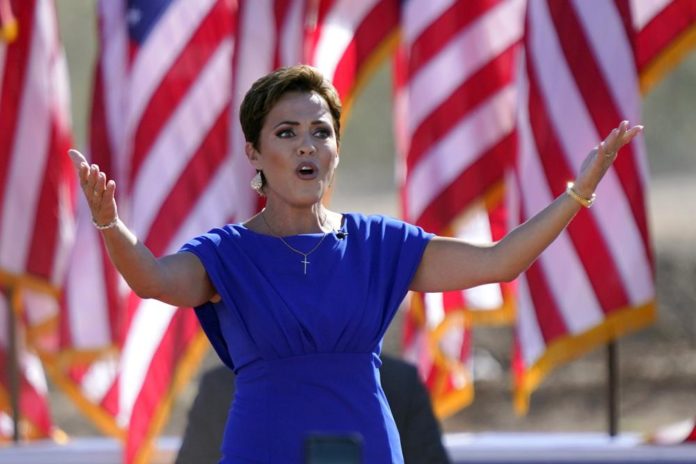
A southern Arizona judge heard from a parade of witnesses Friday in a case brought by opponents of an unusual plan driven by local officials who question the accuracy of ballot-counting machines and want to hand-count all the ballots in the election that concludes next week.
Among those taking the stand was an elected Republican official in rural Cochise County who has agreed to take over the county election director’s normal job of conducting a post-election audit of the vote count by hand — this time expanding it from a small effort using a sample of ballots to a massive one covering four races on about 40,000 ballots.
The elections director testified that she faces a potential felony if implementing the plan ends up violating the law.
Cochise County Recorder David Stevens was grilled in court by lawyers representing a retiree group suing to block the effort. He defended the plan, which is highly unusual and stands as nearly unprecedented in the state.
Stevens said he plans to start the hand-count after voting ends Tuesday and use more than 250 volunteers he’s recruited from three political parties, although the group is heavily tilted towards registered Republicans. He vowed to follow the law that lays out rules for the much-smaller hand-count audits done to check machine vote-counting equipment. But he acknowledged he’s bypassing the county elections director, who by law oversees the process and is responsible for securely holding the ballots.
And responding to questions from the lawyer for the Arizona Alliance of Retired Americans, Lalitha Madduri, Stevens said he planned to count an estimated 30,000 early ballots despite provisions in the law that limit early ballot hand-count audits to 1% or 5,000 ballots, whatever is less, and that they be randomly selected. That bars a full hand-count of the early votes, she said.
Stevens said the Cochise County board of supervisors had voted on the plan and authorized him to conduct the count.
“The court will decide if it’s legal or not,” he said. “But they did vote — it was a two-to-one vote — they voted for me to do this and a 100% count.”
The two Republican supervisors who voted to do the 100% hand-count rather than the small sample done in every other election were pushed to do so by people who believe former President Donald Trump’s unfounded claims that fraud or counting problems with voting machines led to his loss in 2020. The lone Democrat on the board opposed the hand-count.
Pima County Superior Court Judge Casey F. McGinley, who is hearing the case in Bisbee after the local county court declared a conflict, is charged with deciding whether the detailed state law on hand-count audits allows the county board of supervisors to expand it to all early ballots. Democratic Secretary of State Katie Hobbs, who is running for governor, contends only a sample of early ballots can be counted under state law.
Republican Attorney General Mark Brnovich, however, issued an informal opinion last week that said all the ballots can be hand-counted. A Nevada county is also pushing a full hand-count to mollify Trump supporters, while leaders of another GOP-led Arizona county rejected a similar effort this week.
McGinley said after a day-long hearing that the lawyers representing the county supervisors and Stevens on one side and Elections Director Lisa Marra and the retiree group on the other had provided so much information there was no way he would rule from the bench.
Instead, he promised a ruling first thing Monday morning and said he fully expected whoever lost would immediately appeal.
“There’s far too much information that’s been presented today,” McGinley said. “Far too much important testimony, far too much important argument, and quite honestly, far too important a question for this court to rush to an answer in an effort to get it done by 5 o’clock today.”
Marra is charged with performing the post-election audits, and testified that she faces a potential felony charge for breaking election law if rules Stevens devises stray outside the law. She also said handing the ballots over to Stevens would break the secure chain of custody for ballots and that expanding the count jeopardizes meeting a Nov. 18 certification deadline.
Attorneys for the retiree group Arizona Alliance of Retired Americans argued that the law does not allow a full hand-count of early ballots, although it does for those ballots cast in person on Election Day.
And Stephani Stephenson, who lives in the small Cochise County community of St. David and is the named plaintiff in the case, testified that she feared a rushed and abnormal process would potentially jeopardize her vote. She said she has faith in the current system.
“I know that people have worked years to come up with a process,” Stephenson said. “And then suddenly, if my county is going down this other road, at this point, no, I do not trust that.”
McGinley questioned Stevens about the normal recount rules and focused on a section of the election rules written by the secretary of state that allows counties to expand the hand-count at their discretion, which appears nowhere in the law. And he wondered how rules on the acceptable margins of error between hand-count audits would apply to a full recount.
Stevens said his view was that a full hand-count needs no margin and that whatever that count turned out to be would be the one that was officially certified. That runs counter to what the board discussed when it decided to do a full hand-count as a test of the official machine count.
Republished with the permission of The Associated Press.














